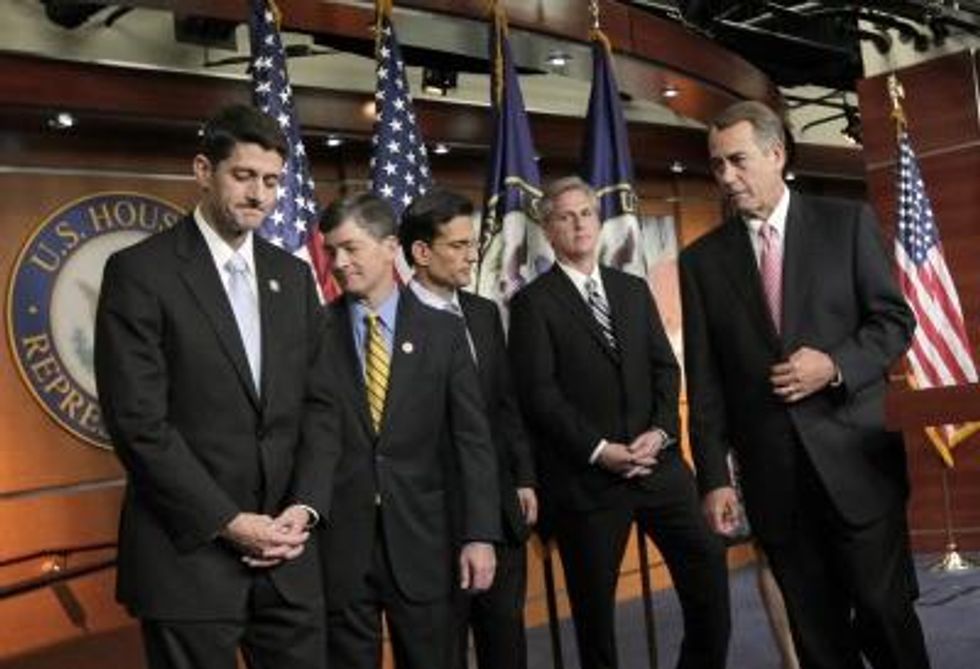President Obama and his advisers are wagering that Republicans will take the political blame if the sequester of $85 billion in automatic budget cuts is actually executed March 1. The president's public remarks keep emphasizing the risk to the recovery, the loss of jobs, the inconvenience to the public and the generally obstructionist posture of Republicans in Congress.
He is certainly right -- in the short run. But the potential for damage to Obama and the Democrats is far greater in the years between now and the next mid-term (2014) and presidential (2016) elections.
Why are Democrats more at risk?
First, though the public tends to hold Congress in lower regard than it holds President Obama, the voters generally blame both parties when Washington seizes up and can't get the public's business done. The austerity lobby has been all too effective at disseminating a rhetoric of "Washington is broken," suggesting symmetrical blame (even though one party is rather centrist and serious about governing while the other has a lunatic strategy of "let it burn.")
If the sequester is executed, we will be treated to usual media bleats of "Where are the grownups?" and "Why can't you people just execute a grand compromise?" with the austerity lobby as ventriloquist.
And "execute" is just the right word, for the Republican price of compromise is savage cuts in what's left of social spending, including Social Security and Medicare, and no serious increases in taxes on the wealthy.
By 2016, and even by 2014, nobody will much remember who was more at fault in the sequester battle of early 2013. The voters will be looking at their own economic situation, and it won't be pretty.
The sequester may bite for a few days or even weeks, but the end-game of this round of budget warfare is all too clear. The president and Congress agree to solve the sequester of automatic cuts -- by substituting budget cuts of a like sum, with most them on the spending side.
But this has exactly the same depressive effect on the recovery as the sequester, itself. According to the CBO and independent economists, cuts of this magnitude will cut this year's economic growth rate in half -- from the 3 percent necessary to signal even the beginning of a recovery to about 1.5 percent according to the Congressional Budget Office. This doesn't even count the likely hit to the stock market.
This moves the budget even further away from the stated goal of reducing the ratio of debt to GDP a decade hence, because it shrinks GDP faster than it reduces debt.
And the sequester is only the beginning of a decade-long process of annual budget cuts of an even greater amount -- at least $120 billion a year, which equals 10 years of economic deflation.
This brings me back to the political consequences for Democrats. The Republicans are willing to take the political heat now, as obstructions, for three reasons.
First, as noted, accountability will be blurred. Both parties will be blamed, and by 2014 the details of the great sequester squabble will be blurry.
Second, any short-term pain to Republicans is outweighed by long-term gain: an austere budget slows the recovery and leaves the Democrats with no economic bragging rights going into 2014 and 2016.
Would the Republicans be that cynical -- to deliberately retard growth so as to embarrass Obama? Is the Pope Catholic? (Actually that's become a more complex question, but I digress.)
The third benefit to Republicans is that the sequester, and all the sequential sequesters over the next decade, deprive Democrats of the resources that they need to be, well, Democrats. Obama can proclaim big, bold initiatives as he did in the State of the Union Address, but they are all mere gestures -- because there is no money to spend on any of them, thanks to the bipartisan obsession with budget cutting.
Even worse, Democrats end up colluding in eviscerating very popular and necessary signature programs like Medicare and Social Security, which literally define the core differences between the two parties.
So by 2016, and even by 2014, nobody will much remember who was more at fault in the sequester battle of early 2013. The voters will be looking at their own economic situation, and it won't be pretty.
Is there nothing Obama and the Democrats can do? The president has challenged Republicans to join him in raising taxes on the rich, to spare the 99 percent the sacrifice of valued programs and the economy a needless double dip recession. That's a start, but he needs to blow up the entire premise that the cure for this economy is more and deeper budget cutting.




